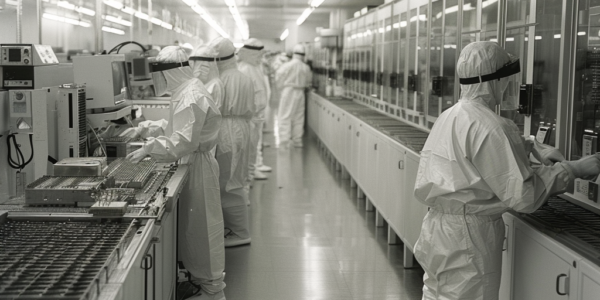Direxion Daily Semiconductors Bear 3x Shares Trading Activity Increases by 40% on Friday
Direxion Daily Semiconductors Bear 3x Shares (NYSEARCA:SOXS) saw a surge in trading activity, with the stock price reaching $29.00. Institutional investors like Jane Street Group LLC and Simplex Trading LLC made significant adjustments to their positions. Learn more about the fund’s performance and investment strategy in our featured articles.
ASML and TSMC Develop Mechanism to Disable Chip-Making Machines in Event of Chinese Invasion of Taiwan
ASML Holding NV and Taiwan Semiconductor Manufacturing Co. have developed a mechanism to remotely disable their advanced chip-making machines in the event of a potential Chinese invasion of Taiwan, addressing concerns raised by the US government about the impact on the global semiconductor industry. ASML’s extreme ultraviolet (EUV) machines, vital for chip production, can be shut down remotely to safeguard operations amidst geopolitical uncertainties.
Finding Value in Semiconductor Stocks for Investors
Looking for cheap semiconductor stocks to invest in? Discover hidden gems in the market like Qualcomm, Applied Materials, and Taiwan Semiconductor. With the AI revolution in full swing, these companies offer promising growth potential for savvy investors. Don’t overpay for overhyped stocks – focus on value and strategic partnerships to capitalize on future gains in the semiconductor sector.
US Lawmakers Approve Billions in Funding to Support Semiconductor Production Onshoring
US lawmakers have approved billions of dollars to support the onshoring of semiconductor production, with Micron set to receive up to $6.1 billion in grants. This move aims to bring semiconductor production back to the United States, enhancing national security and competitiveness against China in the chip industry. The funding falls under the CHIPS and Science Act, supporting Micron’s construction of facilities in New York and Idaho, marking a significant reinvestment in cutting-edge memory chip manufacturing after a 20-year hiatus.
Taiwan’s Earthquake and the Fragility of the Global Tech Industry
Taiwan’s earthquake on April 3 had minimal casualties thanks to strong building codes and earthquake preparation. The island’s semiconductor industry, crucial to the global tech industry, largely emerged intact, but the fragility of these nodes in the global economy is a reminder of their importance.
The World’s Only Producer of Quartz for Semiconductor Manufacturing
Two mines in North Carolina are the world’s only producer of the quartz necessary for semiconductor manufacturing. If they were to stop operating, it would mean a few years of catastrophic disruption, says Wharton professor Ethan Mollick. Spruce Pine, a small town in North Carolina, is home to these crucial mines, which are the sole supplier of the quartz required to make the crucibles needed to refine silicon wafers. The importance of these mines to the global semiconductor industry and solar photovoltaic markets has been highlighted in various media and publications.
Exploring Alternative Chip Stocks for Investment Opportunities
Looking for alternative chip stocks to invest in? Consider ASML, GlobalFoundries, and Skyworks Solutions as promising options with potential for growth and value. These lesser-known companies offer attractive opportunities for investors seeking exposure to the semiconductor sector without paying premium valuations.
Breakthrough in Wearable Technology: ‘Hair-Thin’ Semiconductor Fibers Developed
Researchers from Nanyang Technological University and the Chinese Academy of Sciences have developed ‘hair-thin’ semiconductor fibers that can be seamlessly woven into any fabric, paving the way for the creation of smart wearable electronics. The fibers, composed of silicon and germanium cores, have the potential to revolutionize the development of flexible wearable devices. The team’s groundbreaking work has been published in the journal Nature under open-access terms, signifying a significant advancement in the field of wearables and sensor technology.
Mizuho Raises Price Targets for Semiconductor Stocks
Mizuho raises price targets for semiconductor stocks including Arm Holdings, NVIDIA, Broadcom, and AMD. The firm highlights AI and Custom Silicon landscape, emphasizing significant upside opportunities for ARM. Investors react to the news with varying opinions on Mizuho’s analysis.
Samsung Electronics Plans to Rename Its Second-Generation 3nm Process to ‘2nm’
Chinese foundries in the semiconductor industry are facing challenges due to overexpansion, while Samsung Electronics plans to rename its second-generation 3nm process to the ‘2nm’ process, with mass production expected to commence in the second half of 2024. Samsung’s rebranding aims to enhance marketing efforts for its foundry services, and the move to consolidate the 2nd-gen 3nm and 2nm processes suggests accelerated mass production of 2nm chips. Intel’s advanced process technology roadmap also demonstrates intense competition within the semiconductor industry, with both Samsung and Intel vying for leadership in advanced process technologies.










